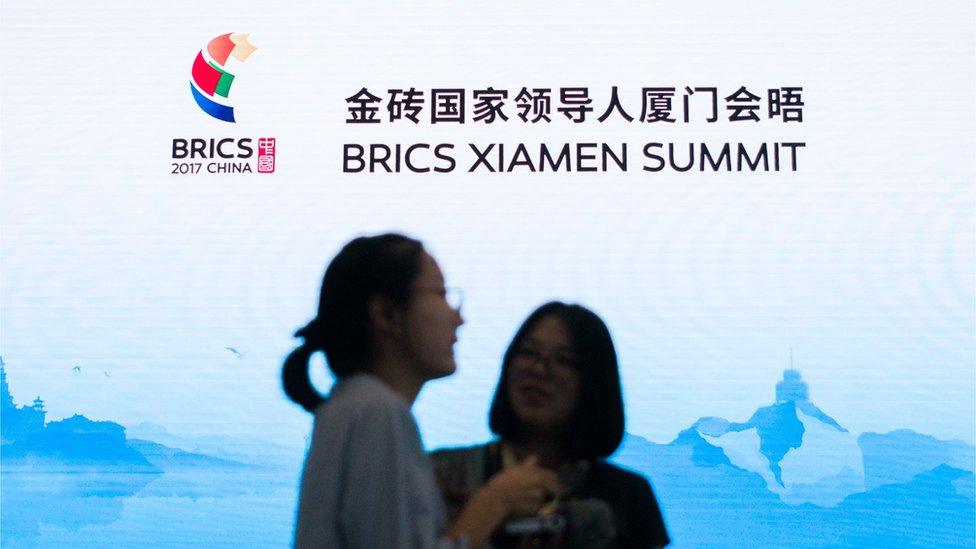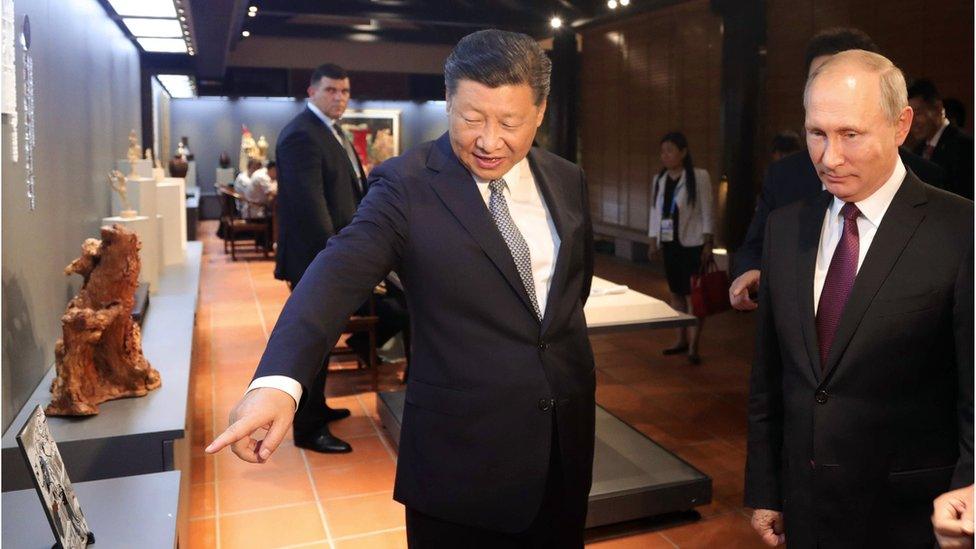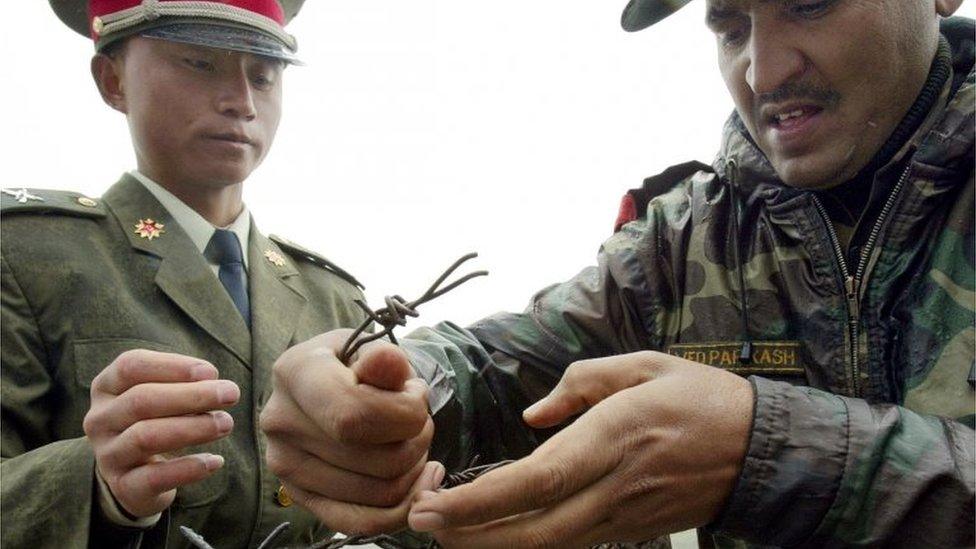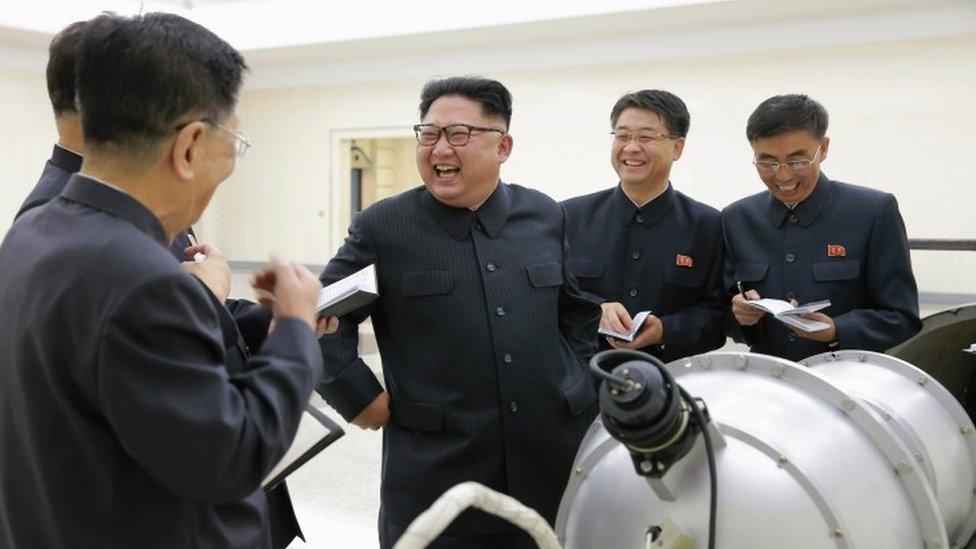Four things to watch at the Brics summit
- Published

The leaders of Brazil, Russia, India, China and South Africa are meeting amid heightened geopolitical tensions.
The summit of the so-called Brics nations brings together the five fast-growing economies, who are seeking a greater say in world affairs.
Economic ties will top the agenda at the three-day gathering in Xiamen, China which began Sunday.
But North Korea's nuclear test and a border standoff between China and India could also colour discussions.
So what are the four key things to watch out for at this meeting?
1. 'Growing the pie' without 'touching the cheese'
While US President Donald Trump has pushed a protectionist trade agenda, pulling the US out of the Trans Pacific Partnership and renegotiating the North America Free Trade Agreement, China is striking a very different tone.
Chinese President Xi Jinping told the meeting that there is little to fear from closer trade ties.
"We should push for an open world economy, promote trade liberalisation and facilitation, jointly create a new global value chain, and realise a global economic rebalancing," President Xi Jinping told Brics business leaders and senior officials in a speech on Sunday.
"The development of emerging markets and developing countries won't touch anyone's cheese, but instead will diligently grow the world economic pie," he said.
But many countries have criticised China's trade policies, saying they discriminate against foreign businesses.
Even within Brics, trade is heavily tilted in China's favour, which has led to complaints from fellow members.
China's vice minister of commerce, Wang Shouwen, also suggested China was interested in establishing a free trade agreement with Mexico.
The Mexican President Enrique Pena Nieto is attending the dialogue at the invitation of the Chinese president.
2. One Belt One Road
The sheer scale of China's massive international infrastructure project - known as One Belt One Road - means it is often on the agenda at high level economic meetings like this one.
The project aims to expand trade links between Asia, Africa, Europe and beyond through infrastructure investments.
"I am convinced that the Belt and Road initiative will serve as a new platform for all countries to achieve win-win cooperation," said President Xi.
But the initiative has made India in particular quite uneasy, as it includes projects worth $62bn (£48bn) to be implemented in its neighbour and rival Pakistan.
Also, tensions between China and India remain high after a border standoff, which was resolved just days before the conference.

President Xi Jinping and Russian President Vladimir Putin visit an exhibition ahead of the BRICS Summit
3. The New Development Bank
Construction began over the weekend on headquarters in Shanghai for the New Development Bank (NDB), which is the Brics alternative to the World Bank.
The NDB was seen as the first major Brics achievement after the group came together to press for a bigger say in the world's financial affairs.
The bank aims to address a massive infrastructure funding gap in the member countries, which account for almost half the world's population.
To date, the NDB has invested in 11 projects, lending $1.5bn in 2016 with an additional $2.5bn in loans set for this year.
Still, the bank is small potatoes when compared with the World Bank, and some have questioned China's commitment, given it heads up the bigger Asian Infrastructure Investment Bank.
4. The nuclear elephant in the room
The conference had an unwelcome surprise in the form of North Korea's sixth nuclear test on Sunday.
China's official Xinhua news agency reported that Chinese President Xi Jinping and Russian President Vladimir Putin met on the sidelines of the Brics meeting, and agreed to "appropriately deal" with North Korea's nuclear test.
China said it strongly condemned the nuclear test and urged Pyongyang to stop its "wrong" actions.
The US President suggested on Twitter that the US might stop "all trade with any country doing business with North Korea".
Allow X content?
This article contains content provided by X. We ask for your permission before anything is loaded, as they may be using cookies and other technologies. You may want to read X’s cookie policy, external and privacy policy, external before accepting. To view this content choose ‘accept and continue’.
China is an obvious target of his comments, given that it is North Korea's largest trading partner.
Some critics, however, have suggested that this is very unlikely, as it would do significant damage to the US economy because China is also America's largest trading partner.
- Published28 August 2017

- Published4 September 2017
